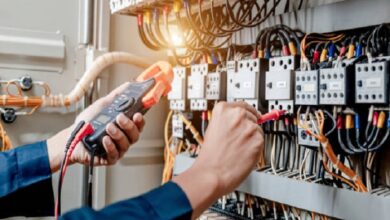How AI Developments Are Shaping Data Center Infrastructure

Artificial Intelligence (AI) is revolutionizing every industry, and data center infrastructure is no exception. The evolution of AI technologies is directly influencing the design, energy management, and operational strategies of data centers. Data centers are required to process vast amounts of information efficiently and rapidly. This need fosters continuous advancements in computing power, cooling systems, and energy efficiency. Companies like Huawei are spearheading these advancements by integrating sophisticated digital and power electronics technologies. These initiatives aim to create low-carbon, reliable, and efficient solutions. In this blog, we will delve into how AI developments are impacting the design, power consumption, cooling, and future trends in data center infrastructure, ultimately transforming the data center landscape.
The Impact of AI on Data Center Design
High-Density Computing Requirements
AI workloads demand significant computational power, driving the need for high-density computing. The shift towards high-density computing architectures necessitates a redesign of traditional data center layouts. More computing power is packed into smaller spaces, making efficient use of available real estate. High-density data centers are often equipped with specialized hardware such as Graphics Processing Units (GPUs) and Tensor Processing Units (TPUs) to handle AI computations. These components are essential for accelerating AI tasks like machine learning and deep learning. To support these high-density environments, there is a focus on advanced cooling solutions and innovative power distribution systems. Companies like Huawei are leading the way with solutions that integrate power supply and distribution, ensuring efficient and reliable operation.
Advanced Cooling Solutions
As high-density computing increases, so does the heat generated by these powerful machines. Efficient cooling is paramount to maintaining data center performance and reliability. Traditional cooling methods are often insufficient for modern high-density data centers. Advanced cooling solutions, like liquid cooling and immersion cooling, are becoming more prevalent. Huawei’s Smart Cooling systems exemplify such advancements by delivering ultimate energy savings and reliability. These cooling solutions are designed to be fast, easy to maintain, and adaptable to different configurations. The integration of sophisticated cooling technologies ensures that high-density data centers can operate efficiently without compromising performance due to overheating.
Power Consumption and Energy Efficiency
Rising Energy Demands of AI Workloads
The computational complexity of AI workloads requires substantial energy. Data centers are therefore experiencing a surge in energy demand. Power consumption is one of the highest operational costs for data centers, and the rise of AI only exacerbates this challenge. Advanced AI algorithms need continuous processing power, leading to higher energy use. This surge necessitates the deployment of more innovative power solutions. Huawei’s emphasis on low-carbon and efficient power utilization demonstrates how integrating digital power solutions can significantly reduce energy consumption. By optimizing energy usage, data centers can manage the escalating demands of AI workloads more sustainably.
Strategies for Enhancing Energy Efficiency
Addressing energy efficiency in data centers is vital for sustainability and cost management. Several strategies have emerged to tackle this challenge. Implementing intelligent power management systems that monitor and control power distribution can significantly enhance efficiency. Huawei’s Smart Power Supply systems exemplify this, offering power supply and distribution systems that are green, smart, and reliable. Another strategy involves utilizing renewable energy sources to power data centers. Incorporating AI for real-time monitoring and predictive analysis can further refine energy use by dynamically adjusting power based on the current workload. These strategies collectively help in creating energy-efficient data centers capable of handling intensive AI applications.
Future Trends in AI and Data Center Infrastructure
Integration of AI in Data Center Operations
The future of data centers lies in the deeper integration of AI into their operations. AI can optimize almost every aspect of data center management, from power efficiency to predictive maintenance. AI algorithms can analyze vast amounts of data to forecast potential issues and optimize resource allocation. Huawei’s Smart Management System is a prime example, offering mobile and intelligent O&M powered by digital intelligence. By employing AI for these tasks, data centers can become not only more efficient but also more proactive in managing resources and mitigating issues before they impact performance.
Sustainability and Green Initiatives
Sustainability is becoming a core focus in the design and operation of data centers. Green initiatives, such as utilizing renewable energy and implementing energy-saving technologies, are essential as the industry grows. Prefabricated Modular Data Centers, like those offered by Huawei, contribute significantly to sustainability. These centers use modular, pre-integrated designs that simplify installation and improve overall efficiency. Additionally, AI-driven solutions optimize cooling and energy use, reducing the carbon footprint. By focusing on sustainability, data centers can support the growing demand for AI processing power in an environmentally responsible manner.

Conclusion
AI developments are significantly reshaping data center infrastructure, driving advancements in design, power consumption, cooling, and overall energy efficiency. The increasing demands of AI workloads necessitate innovative solutions in high-density computing, cooling, and sustainable power usage. As a result, the modern Data Center Facility is evolving into a more intelligent and adaptive environment. Industry leaders like Huawei are at the forefront, providing the technologies and strategies needed to meet these challenges effectively. As AI continues to evolve, Data Center Facilities will increasingly integrate intelligent systems that enhance performance and sustainability. The future of data centers promises to be more efficient, reliable, and environmentally conscious, ensuring they can meet the growing needs of the digital world.




